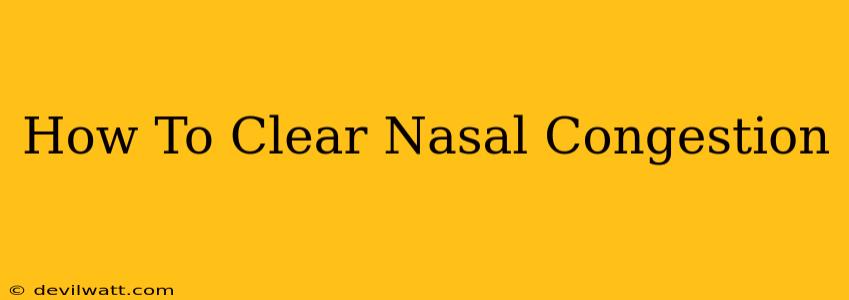Nasal congestion, that frustrating stuffiness that makes breathing difficult, is a common problem caused by various factors like the common cold, allergies, or even environmental irritants. Feeling congested can significantly impact your sleep, energy levels, and overall well-being. Fortunately, there are several effective ways to alleviate nasal congestion, ranging from simple home remedies to medical interventions. This guide will explore various methods to help you breathe freely again.
Understanding the Causes of Nasal Congestion
Before diving into solutions, it's important to understand why you're congested. Knowing the underlying cause can help you choose the most effective treatment. Common culprits include:
- The Common Cold: Viral infections are a leading cause of nasal congestion, often accompanied by other cold symptoms like coughing, sneezing, and a runny nose.
- Allergies: Allergens like pollen, dust mites, and pet dander trigger an inflammatory response in the nasal passages, leading to congestion, sneezing, and itchy eyes.
- Sinusitis: Inflammation of the sinuses can cause significant congestion, often accompanied by facial pain and pressure.
- Flu: Influenza, a more severe viral infection, can cause congestion along with fever, body aches, and fatigue.
- Environmental Irritants: Exposure to smoke, dust, or other irritants can irritate the nasal passages and cause congestion.
- Dehydration: Lack of fluids can thicken mucus, making congestion worse.
Effective Home Remedies for Nasal Congestion Relief
Many effective home remedies can provide quick relief from nasal congestion:
1. Saline Nasal Rinse (Neti Pot):
A saline nasal rinse is a highly effective way to clear nasal passages of irritants and mucus. Using a neti pot or similar device, gently rinse your nasal passages with a saline solution. This helps to thin the mucus and flush out allergens and irritants. Ensure you use distilled or sterile water to avoid infection.
2. Steam Inhalation:
The warmth and moisture from steam can help loosen mucus and ease congestion. Inhale steam from a bowl of hot water (carefully!), or take a hot shower. Adding essential oils like eucalyptus or peppermint can enhance the effect.
3. Stay Hydrated:
Drinking plenty of fluids, especially water, helps thin the mucus and makes it easier to clear from your nasal passages. Aim for at least 8 glasses of water per day, especially when congested.
4. Elevate Your Head:
Sleeping with your head elevated can help drain mucus from your nasal passages, making it easier to breathe. Use extra pillows to raise your head and upper body.
5. Over-the-Counter Medications:
Various over-the-counter medications can provide relief from nasal congestion:
- Decongestants: These medications, available as nasal sprays or oral tablets, help shrink swollen blood vessels in the nasal passages, reducing congestion. However, overuse of nasal decongestant sprays can lead to rebound congestion, so follow the instructions carefully.
- Saline Nasal Sprays: These sprays help moisturize the nasal passages and thin mucus, making it easier to clear.
- Pain Relievers: Over-the-counter pain relievers like acetaminophen (Tylenol) or ibuprofen (Advil, Motrin) can help reduce pain and fever associated with congestion.
When to See a Doctor for Nasal Congestion
While many cases of nasal congestion resolve on their own with home remedies, you should see a doctor if:
- Your congestion lasts for more than 10 days.
- You have a high fever.
- You experience severe facial pain or pressure.
- You have green or yellow nasal discharge.
- You have difficulty breathing.
- You have other concerning symptoms.
Ignoring persistent or severe nasal congestion can lead to more serious complications. A doctor can properly diagnose the underlying cause and recommend the appropriate treatment.
Preventing Nasal Congestion
Prevention is always better than cure! Here are some tips to minimize your chances of getting nasal congestion:
- Wash your hands frequently: This helps prevent the spread of viruses and bacteria.
- Avoid allergens: Identify and avoid triggers like pollen, dust mites, or pet dander.
- Quit smoking: Smoking irritates the nasal passages and increases your risk of respiratory infections.
- Get enough sleep: A strong immune system is crucial for fighting off infections.
By following these tips and seeking medical attention when necessary, you can effectively manage and alleviate nasal congestion and breathe easier. Remember, consulting a healthcare professional is vital for accurate diagnosis and personalized treatment plans, particularly if your symptoms are severe or persistent.

